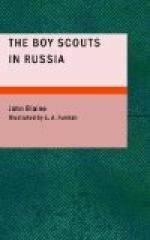He was able on the trip to see what was going on, since no attempt was made to keep him from doing so. And everything he saw served only to impress him more and more with the utter hopelessness of his position. The roads were choked with dense masses of advancing Russians. Troops, horse and foot, hospital trains, ammunition and provision trains, guns—all were moving up; evidently in preparation for the striking of a heavy blow at the German power in East Prussia on a new line of attack.
For the first time Fred saw a country that was really in the grip of a modern army. The swift movements of the German army around the Suvaroff house had not given this impression. There were not so many Germans, relatively speaking at least, and their movements were made with less confusion and greater speed, owing to their possession of railways that had been built with an especial view to their being used in time of war.
Here the railways had all been destroyed by the Germans who had retreated before the advancing Russians. In many places, too, fields had been burned over, that the standing crops might not fall into the hands of the invaders.
Fred almost laughed at the irony of the whole sight. It was because of him that this movement was being made. At great risk to himself he had obtained the information that had led to the sudden change in the Russian plans, of which the great movement he saw was a part. He should be receiving thanks and honors instead of being on his way to headquarters as a prisoner of war, condemned, as he well knew, in advance. For Fred had no illusions. He knew the power of Mikail Suvaroff, who was so plainly an important member of the high Russian command. Against so great a man his word would be valueless.
“This Russian army is like a steam roller,” Fred thought to himself. “It may be stopped here or there, but not for long. It will roll over this whole country sooner or later. Well—I’m glad! Even if I’ve got to suffer because my uncle hates me, it’s not Russia’s fault. I want Russia to win.”
His guards treated Fred well enough. He had an idea that he owed the consideration he received to Lieutenant Sazonoff. He was quite sure that General Mikail Suvaroff had nothing to do with it! And his journey, which might have been one of acute discomfort, was made more than tolerable.
It was late when the train in which he rode after the border was reached arrived in Grodno. Here the army was in complete possession. Men in uniform were everywhere; the civilian population seemed almost to have disappeared. The din was constant. For hours, after he had been taken to a cell in the central police station, he lay awake and listened. Guns rumbled through the streets, motor cars chugged all through the night. He was aroused in the morning by sounds of frantic, steady cheering, and when the guard brought him his breakfast, he asked what that meant. The man’s eyes lighted up.




